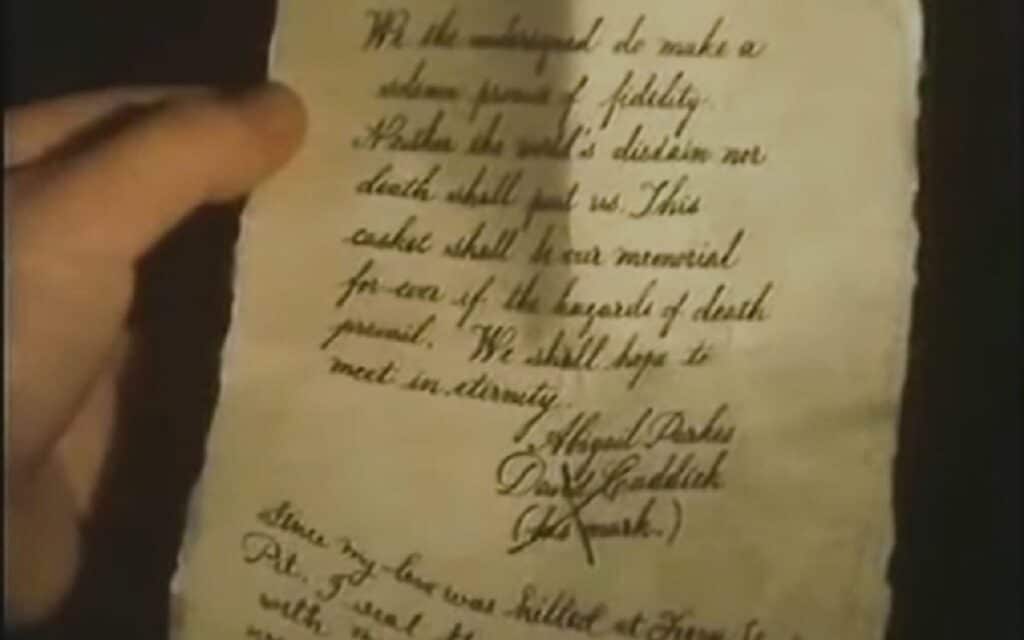Ghost in the Water 1982 is a thoughtful, mystery-orientated supernatural tale worth a view, says RICHARD MARKWORTH

TITLE: Ghost in the Water
ORIGINAL TRANSMISSION DATE: 31 December 1982 at 4.40pm on BBC One
DIRECTOR: Renny Rye
CAST: Judith Allchurch, Ian Stevens, Jane Freeman, Dave Mitty, Joanne James, Hilary Mason, Paul Marks, Lynda Higginson
Ghost in the Water 1982 Review
The BBC has long produced supernatural dramas for adult audiences with the 1970s and 80s being a particularly rich period in this regard.
Productions such as A Ghost Story for Christmas (1971-1978), anthology series Supernatural 1977, and the adaptation of Count Dracula 1977, starring Louis Jourdan as the eponymous vampire, are acknowledged as classics of the genre.
However, it was not just the grown-ups that Auntie Beeb targeted with such chilling fare. Children’s programming of this era also contained its fair share of spookily themed offerings designed to unnerve the younger viewer.
One such example is Ghost in the Water 1982, dramatised by Geoffrey Case from Edward Chitham’s 1973 source novel and directed by Rennie Rye who would go on to helm the BBC’s BAFTA award-winning fantasy, The Box of Delights 1984.
Although a contemporary tale, the film opens in classic ghost story manner. We meet the young protagonists Tess (Judith Allchurch) and David (Ian Stevens) as they explore a local cemetery at night whilst engaged in a school history project. A storm thunders about them and flashes of lightening intermittently illuminate the rows of aged headstones in a suitably eerie fashion. It’s hard to imagine school safeguarding policy endorsing such expeditions nowadays.
The pair seek and locate a particular gravestone, belonging to one Abigail Parkes who died in 1860 at the tender age of 18. Abigail happens to be the embroiderer of a framed Victorian “sampler” which hangs in Tess’s family home hence the youngsters’ interest in her grave. The school friends are intrigued by the enigmatic legend “Innocent of all Harm” inscribed on the stone.
After arriving home that night Tess falls into a troubled sleep and dreams vividly of a funeral. Within the dream, a stern-faced man disturbingly barks, “Get away”. Initially unsure if she is confusing reality with the horror film her family had been watching on her return, Tess eventually becomes convinced she has somehow witnessed Abigail Parkes’ burial.
Tess and David resolve to investigate the circumstances of Abigail’s death, officially recorded as suicide. The accepted narrative states the tragic girl drowned herself in the nearby canal, heartbroken at the untimely passing of her sweetheart, David Caddick, in a mining accident. Tess is adamant this version of history is incorrect, and the truth of the matter is yet to be uncovered. Furthermore, she feels a strange connection to the deceased Abigail.
As the story progresses Tess is subjected to frightening visions of Abigail who seems to be attempting to communicate with her directly, if not overtly possess her. After a shocking incident in which Tess, whilst taking a bath, involuntarily relives Abigail’s drowning, the beleaguered girl tells David she is unsure if the dead teen “wants my help or she’s trying to kill me”.
Further investigations reveal Tess has a hitherto unknown familial link to Abigail and, as the anniversary of the ill-fated girl’s death arrives, the true secret of her premature end is finally disclosed.
Although the trope of a restless spirit seeking to resolve issues pertaining to their demise is a familiar one, Ghost in the Water is an admirable example of this type of story. Excellent use is made of the Black Country filming locations, with the shadowy graveyard and the sinister darkened tunnels of the canal skilfully utilised to instil a truly spooky feel to the production.
Rye keeps the story moving briskly and, despite the relatively brief running time, successfully manages to incorporate elements of family drama, star-crossed love, musings on the nature of belief and the search for buried truths within his atmospheric ghost story. An impressive feat, especially when considered within the context of a programme produced primarily for children.
The two young leads provide naturalistic and genuinely likeable performances. They are perfectly believable as the outsider school kids, enthusiastically carrying out their project despite the sneering attitude of more popular classmate, Tracy Dobbs (Lynda Higginson) and her giggling acolytes.
In a clever move by the programme makers, Joanne James portrays both Abigail Parkes and Tess’s older sister Jean. This dual role reinforces the unsettling nature of Tess’s ghostly visons by further blurring the line between the past and present for both the audience and Tess herself as she undergoes her uncanny experiences.
The rest of the cast, including seasoned performers Jane Freeman (Last of the Summer Wine) and Hilary Mason (Don’t Look Now), supply solid support throughout and add further polish to the production.
Ghost in the Water 1982 is highly recommended for anyone who prefers thoughtful, mystery-orientated supernatural tales with a human story at their heart, as opposed to those of a more sensationalist or gory nature and is long overdue another airing by the BBC.
Have you seen Ghost in the Water 1982? Tell us your thoughts in the comments section below!







